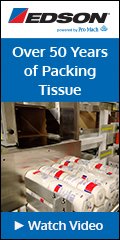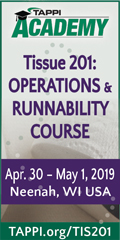
| Archive/Subscribe | TAPPI.org | Advertise | TAPPI Press Catalog | April 2018 |
Sofidel Promotes "Natural Capital: Valuing our Wealth" Debate
Sofidel is continuing to pursue its commitment to raising the awareness of the public opinion concerning the effects of climate change, and in this case in particular the value of natural ecosystems. After having been WWF Italia main partner for "Earth Hour", the global mobilization event from the environmental association on the theme of climate change which took place in March, Sofidel, among the global leaders in tissue production, has promoted the debate titled "Natural capital: valuing our wealth", in collaboration with WWF Italia and Fondazione Giangiacomo Feltrinelli.
The meeting is intended as an opportunity to reflect on and explore the "value" of nature, its status as an asset essential to our well-being and development and consequently our economy and our future.
For many economists, the time has come to overhaul the logic and policy that govern our development, to offer a new economic paradigm capable of integrating equity and respect for the fundamental rights of each human being with the biophysical limitations of our planet.
At the centre of the reflection is the concept of "natural capital", on which we depend and without which we couldn’t live: the most recent legislative development, the value of biodiversity and ecosystem services, the role of responsible companies, the correlations that exist between production processes, product design, consumer habits and their impact on the environment, as well as on society and the economy.
An area which also sees attention from the United Nations through the 2030 Agenda and the 17 Sustainable Development Goals, the 15th Goal in particular – Life on Land – which aims to protect, restore and promote sustainable use of terrestrial ecosystems, sustainably manage forests, halt and reverse land degradation and halt biodiversity loss.
"We are pleased to promote, after the one dedicated to water last year, this new occasion for reflection on such a fundamental subject as the value of natural capital," stated Luigi Lazzareschi, CEO of the Sofidel Group. "Sofidel’s sustainable growth strategy is completely in line with the 17 United Nations Sustainable Development Goals and sees our engagement on two fronts. Firstly in terms of production, to improve the efficiency of our processes and products, so guaranteeing less use of natural capital. Secondly, together with our partners, to spread the culture of sustainability and offer opportunities to investigate issues central to contemporary debate.
A role of stimulation and service that we consider more necessary than ever in these times of fake news and misleading simplifications."
"Natural capital cannot continue to be invisible within economic models," stated Gianfranco Bologna, Scientific Director of WWF Italia. "We need to identify methods ‘accounting for’ nature, attempting to assign it a value that must not and cannot be identified only in monetary terms, because the value of the structures, processes, functions and services of natural systems goes well beyond monetary reporting. A change of approach with respect to natural resources must become a rule guiding the economic programming and business choices of companies. The Italian Natural Capital Committee, established through law 221/2015, has already produced two reports on the condition of Italian natural capital, the 2017 report and the 2018 report published at the end of February. The value of our natural capital must now contribute to the direction of both the Economic and Financial Document and the Budget Law."
Sofidel employs sustainability as a strategic lever for development. This commitment has been strengthened in 2008 by joining the WWF Climate Savers program, through which Sofidel took on particularly ambitious targets for reducing climate-changing emissions. In 2017, Sofidel reduced its carbon intensity by 20.6 percent with respect to the 2009 base values per kilo of paper produced, and water consumption in production processes was well below the benchmark for the sector (7.1 L/kg vs. 15-25 L/kg). It also uses pulp certified by independent third parties with responsible forestry management schemes (100 percent in 2017, FSC®, FSC® Controlled Wood, PEFC™, SFI®).
|



